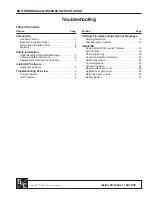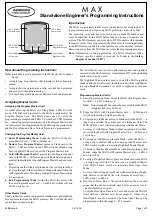
Inter-Integrated Circuit (S08IICV2)
MC9S08QE128 MCU Series Reference Manual, Rev. 2
Freescale Semiconductor
233
12.4.3
General Call Address
General calls can be requested in 7-bit address or 10-bit address. If the GCAEN bit is set, the IIC matches
the general call address as well as its own slave address. When the IIC responds to a general call, it acts as
a slave-receiver and the IAAS bit is set after the address cycle. Software must read the IICD register after
the first byte transfer to determine whether the address matches is its own slave address or a general call.
If the value is “00”, the match is a general call. If the GCAEN bit is clear, the IIC ignores any data supplied
from a general call address by not issuing an acknowledgement.
12.5
Resets
The IIC is disabled after reset. The IIC cannot cause an MCU reset.
12.6
Interrupts
The IIC generates a single interrupt.
An interrupt from the IIC is generated when any of the events in
occur, provided the IICIE bit
is set. The interrupt is driven by bit IICIF (of the IIC status register) and masked with bit IICIE (of the IIC
control register). The IICIF bit must be cleared by software by writing a 1 to it in the interrupt routine. The
user can determine the interrupt type by reading the status register.
12.6.1
Byte Transfer Interrupt
The TCF (transfer complete flag) bit is set at the falling edge of the 9th clock to indicate the completion of
byte transfer.
12.6.2
Address Detect Interrupt
When the calling address matches the programmed slave address (IIC address register) or when the
GCAEN bit is set and a general call is received, the IAAS bit in the status register is set. The CPU is
interrupted, provided the IICIE is set. The CPU must check the SRW bit and set its Tx mode accordingly.
12.6.3
Arbitration Lost Interrupt
The IIC is a true multi-master bus that allows more than one master to be connected on it. If two or more
masters try to control the bus at the same time, the relative priority of the contending masters is determined
by a data arbitration procedure. The IIC module asserts this interrupt when it loses the data arbitration
process and the ARBL bit in the status register is set.
Arbitration is lost in the following circumstances:
Table 12-11. Interrupt Summary
Interrupt Source
Status
Flag
Local Enable
Complete 1-byte transfer
TCF
IICIF
IICIE
Match of received calling address
IAAS
IICIF
IICIE
Arbitration Lost
ARBL
IICIF
IICIE
Содержание MC9S08QE128
Страница 2: ......
Страница 4: ......
Страница 49: ...Chapter 3 Modes of Operation MC9S08QE128 MCU Series Reference Manual Rev 2 50 Freescale Semiconductor ...
Страница 138: ...Chapter 6 Parallel Input Output Control MC9S08QE128 MCU Series Reference Manual Rev 2 138 Freescale Semiconductor ...
Страница 144: ...Chapter 7 Keyboard Interrupt S08KBIV2 MC9S08QE128 MCU Series Reference Manual Rev 2 144 Freescale Semiconductor ...
Страница 166: ...Chapter 8 Central Processor Unit S08CPUV4 MC9S08QE128 MCU Series Reference Manual Rev 2 166 Freescale Semiconductor ...
Страница 174: ...MC9S08QE128 MCU Series Reference Manual Rev 2 174 Freescale Semiconductor Analog Comparator S08ACMPV3 ...
Страница 202: ...12 bit Analog to Digital Converter S08ADCV1 MC9S08QE128 MCU Series Reference Manual Rev 2 202 Freescale Semiconductor ...
Страница 282: ...Serial Peripheral Interface S08SPIV3 MC9S08QE128 MCU Series Reference Manual Rev 2 282 Freescale Semiconductor ...
Страница 306: ...Timer PWM Module S08TPMV3 MC9S08QE128 MCU Series Reference Manual Rev 2 306 Freescale Semiconductor ...
Страница 320: ...Development Support MC9S08QE128 MCU Series Reference Manual Rev 2 320 Freescale Semiconductor ...
















































